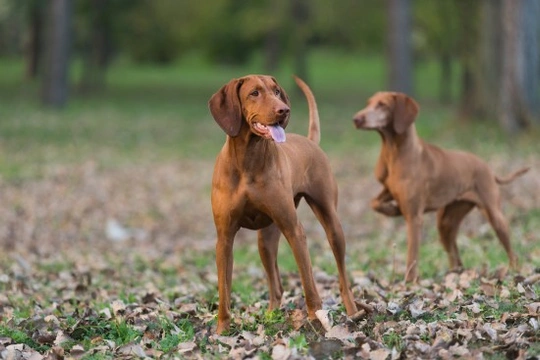
Should unspayed female dogs be kept apart when they are in season?
An unspayed female dog will come into season once or twice a year, and as part of this process of being receptive to mating and reproduction, your bitch will go through a range of other hormonal changes too. This can lead to issues such as overtly sexualised behaviour, personality changes, difficulty walking your dog around other dogs, and an overwhelming drive to find a mate!
These things can be challenging enough on their own if you only own one unspayed bitch, but if you have two, you will really have your hands full! If you have two or more unspayed bitches living together, the chances are that they will come into heat at roughly the same time, doubling your potential problem and adding an additional element to it too!
When a bitch is in season, her mind is on mating and finding a suitable male dog, and this places her into direct competition with any other bitch in season within range of her, which can lead to some very out-of-character behaviour such as aggression and fighting, even among dogs that usually get on well.
So, how should you deal with this potential problem, and should you split your unspayed bitches up if one or both of them are in season? Read on to learn more.
Potential aggressive tendencies
Depending on the personalities and traits of your two dogs, you may not run into any problems at all when one or both of them is in season. Some unspayed bitches are totally accepting of the presence of the other dog, and will not act out towards them at all. This is most likely to occur if the two bitches are not in season simultaneously, and so you only have the hormonal urges of one dog at a time to deal with.
However, heightened levels of aggression when in heat is one of the most common traits of the female dog’s season, and your usually good natured dog might well become grumpy, defensive or dominant. This is particularly likely to be manifested towards another dog of the same sex, particularly an unspayed one and even more so if she is also in season.
If you begin to see signs of snappishness in one or both dogs when either or both of them are in season, separate them right away for the duration, to avoid either dog becoming hurt or injured as part of a fight or bid for dominance.
General moodiness
Aggression and a low tolerance threshold for other female dogs is not the only potential problem that can occur when a bitch is in heat. As part of being in season and the increased hormone levels that come with this, many female dogs will become rather more grumpy, intolerant and unresponsive to commands than is usual for them. They may manifest their change in hormone levels in a whole range of ways, including being overtly clingy and snappy if the other dog is getting attention, finding it hard to settle down, exhibiting a constant low-level anxiety, or trying to escape to go off in search of a mate.
This may mean that even the presence of the other dog within their space will contribute to their anxiety levels, and make the mood-related problems that can accompany being in heat worse, even if this does not manifest as aggression. In this situation, keeping the two bitches apart until things get back to normal is again potentially a good idea.
Keeping your bitches away from male dogs
Even if your unspayed bitches tend to be fine with each other even when one or both are in season, throw the presence of an un-neutered male dog into the mix, and you might be looking at world war three. Obviously it is necessary to keep your bitch in heat away from un-neutered male dogs to avoid them breeding unless you are planning a mating, but there are many other reasons to keep them away as well.
Un-neutered male dogs can scent out a bitch in season from up to several miles away, and you might find that when your bitch is in season, suddenly a lot of dogs seem to be hanging around near to your home. Your bitches will be all too aware of this and try to join the male dog or dogs to mate, which can prove to be a flashpoint for aggression between the two bitches, who will suddenly see each other as competition.
As well as the potential need to keep your two female dogs apart when one or both are in season, if you have more than one un-neutered male dog, these should be kept away from each other too, as they too are liable to fight with very little provocation.
Spaying
If there is no good reason for keeping your female dogs entire, ie, if you do not wish to breed from them and there is no underlying health problem that makes spaying potentially dangerous, you should consider having either one or both of them spayed. As well as preventing unwanted litters, spaying your bitches will level out their hormone levels, and reduce or negate the problems that can arise when one or both bitches is in season.



